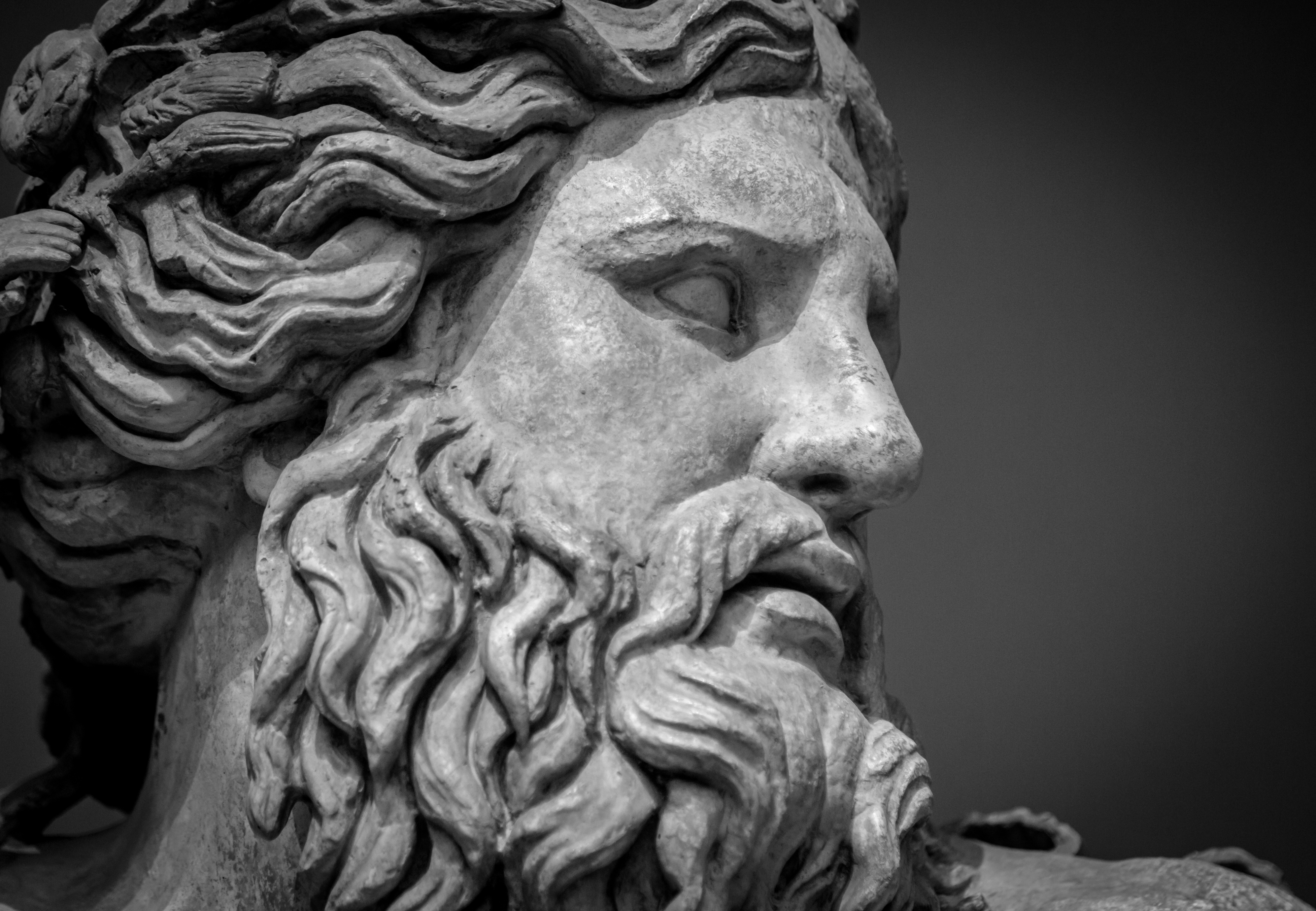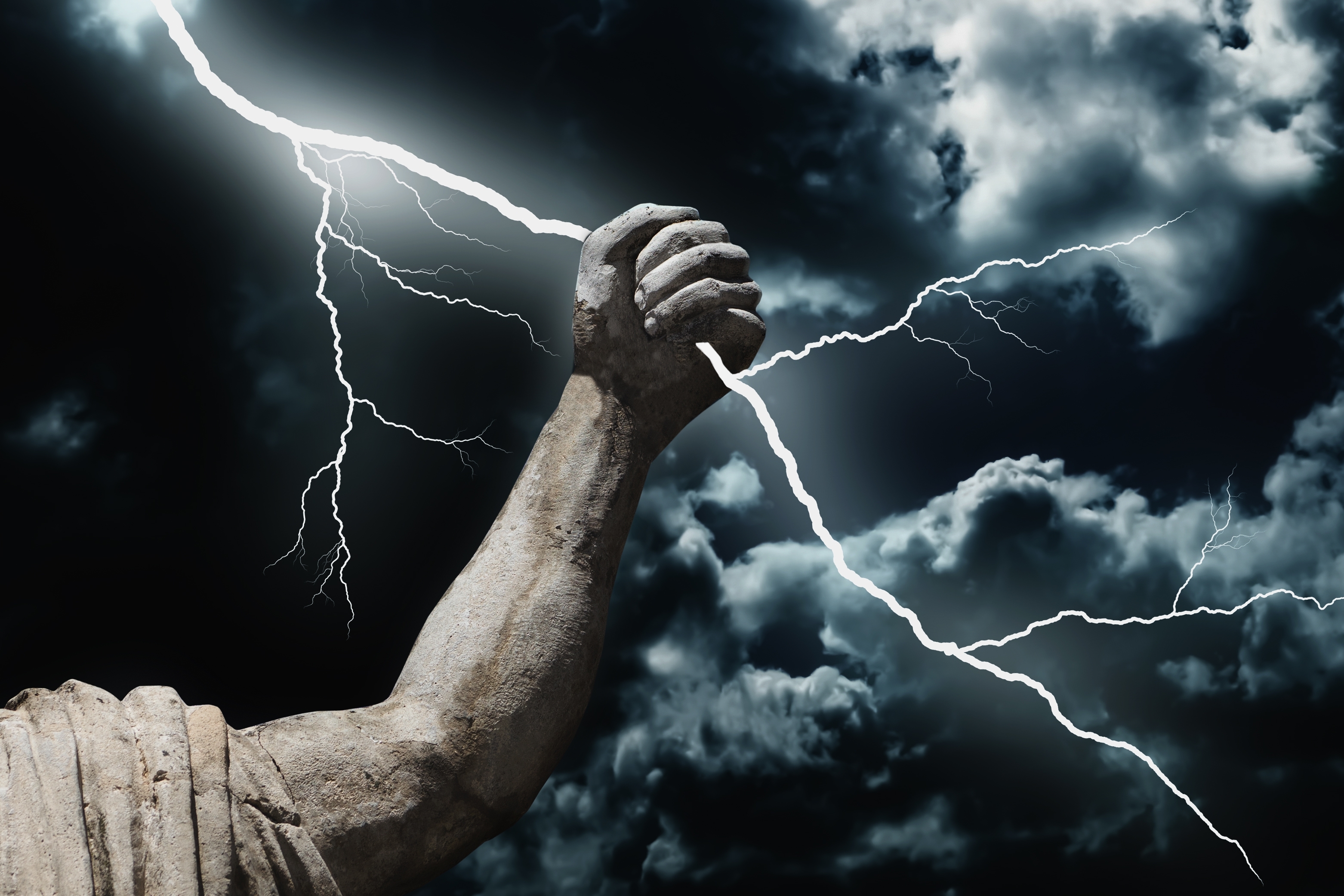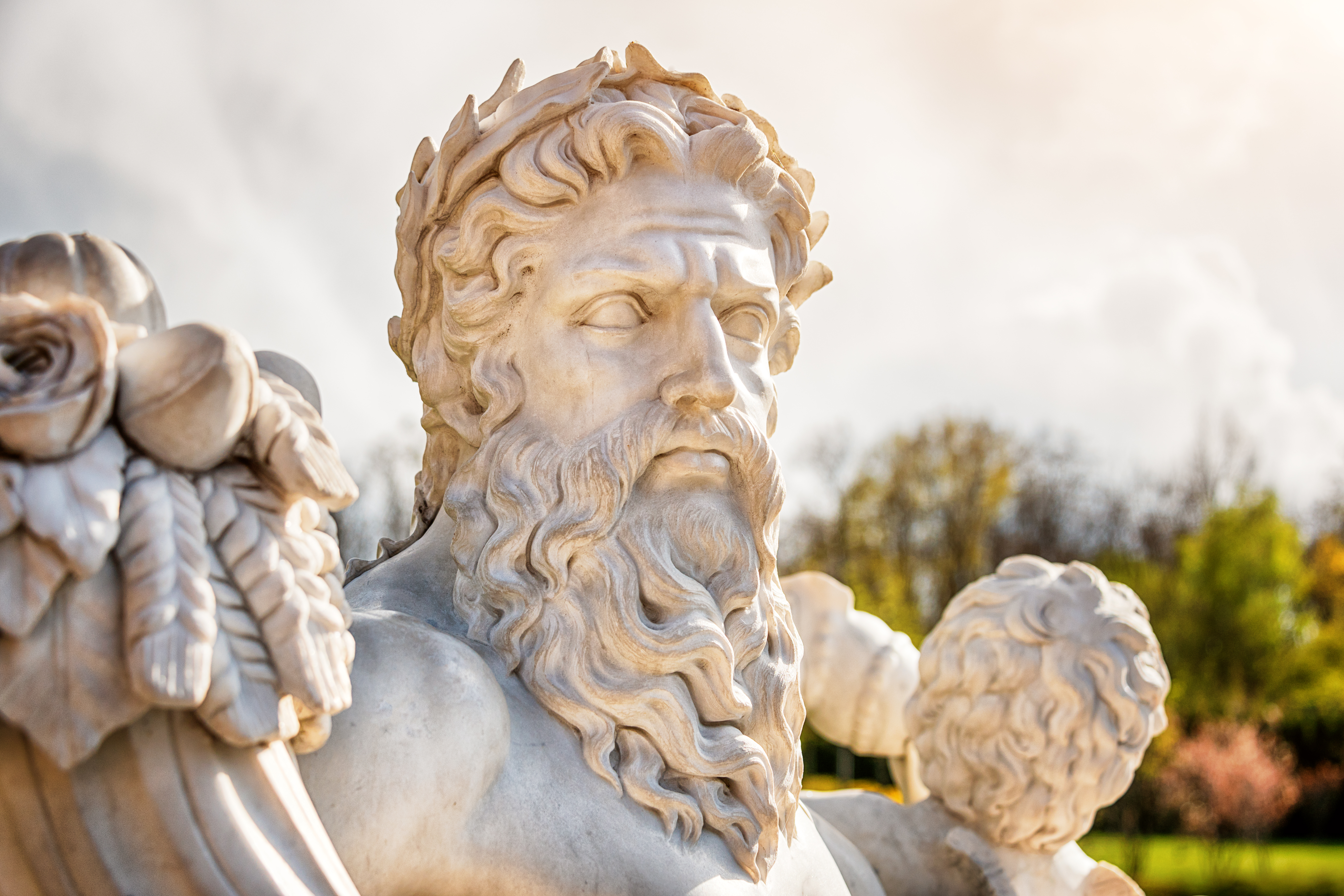Zeus is the formidable king of the gods in Greek mythology. His story is a complex web of family dynamics, adventures, and a profound impact on the pantheon of Greek deities. So, who was Zeus, and why does he hold such a significant place in Greek mythology?
Jump to:
The Rise of Zeus: From Humble Beginnings to King of the Gods

Zeus's journey to becoming the king of the gods is nothing short of extraordinary. Born to the Titans Cronus and Rhea, his very existence was a testament to resilience and cunning. Fearing a prophecy that one of his children would overthrow him, Cronus devoured each of his offspring at birth. Rhea, desperate to save her youngest, Zeus, tricked Cronus by feeding him a stone wrapped in swaddling clothes instead.
Hidden in a cave on Crete, Zeus grew strong and wise, away from his father's prying eyes. When the time was right, with the help of his mother and the Titaness Metis, Zeus cunningly made Cronus regurgitate his siblings. United, they waged a war against Cronus and the Titans, known as the Titanomachy, which ended with Zeus and his siblings' victory. This triumphant battle established Zeus as the king of the gods, ruling from his throne on Mount Olympus.
Zeus's Family and Relationships
Zeus's intricate web of relationships forms a cornerstone of Greek mythology, offering insight into his multifaceted character and the complex dynamics of divine and human interactions.
Children of Zeus
Zeus's children are a testament to his powerful legacy, with each playing a significant role in the myths and the functioning of the world according to ancient Greek beliefs.
- Athena: Goddess of wisdom and strategic warfare, born from Zeus’s forehead.
- Hephaestus: God of blacksmiths, craftsmen, artisans, sculptors, metals, metallurgy, fire, and volcanoes, son of Zeus and Hera.
- Ares: God of war, known for his destructive nature, son of Zeus and Hera.
- Apollo: God of the sun, light, music, and prophecy, twin brother of Artemis, born to Leto.
- Artemis: Goddess of the hunt, wilderness, childbirth, and virginity, twin sister of Apollo, born to Leto.
- Hermes: Messenger of the gods, god of trade, thieves, travellers, sports, athletes, and border crossings, son of Maia.
- Persephone: Queen of the underworld, daughter of Demeter, and by Zeus.
- Dionysus: God of wine, vegetation, pleasure, festivity, madness, and wild frenzy, born to Semele.
- Hercules: Hero famed for his incredible strength and twelve labours, son of Alcmene.
- Perseus: Hero known for beheading Medusa, son of Danaë.
- Minos: King of Crete who became a judge of the dead in the underworld, son of Europa.
- Helen of Troy: Said to be the most beautiful woman in the world, daughter of Leda (and either Zeus in the form of a swan or Tyndareus).
- Castor and Pollux (Dioscuri): Twin brothers of Helen, skilled in horseback riding and boxing, sons of Leda (Pollux is Zeus’s son, Castor is Tyndareus's son).
- Rhodes: Hero of the island of Rhodes, born to the nymph Himalia.
Lovers of Zeus
Zeus's love affairs involved both goddesses and mortal women. Each relationship resulted in the birth of various deities and heroes:
- Hera: Sister and wife, known for her jealousy and the tumultuous nature of their relationship.
- Leto: Mother of Apollo and Artemis, whom Hera persecuted out of jealousy.
- Maia: A Pleiad nymph and the mother of Hermes.
- Semele: A mortal princess of Thebes, mother of Dionysus, who perished upon witnessing Zeus's divine form, leading to Dionysus's birth from Zeus's thigh.
- Io: A mortal priestess of Hera whom Zeus transformed into a cow to protect her from Hera's wrath.
- Europa: A Phoenician princess abducted by Zeus in the form of a bull, mother of Minos, Rhadamanthus, and Sarpedon.
- Leda: Queen of Sparta who was seduced by Zeus in the form of a swan, mother of Helen, and, in some versions, the Dioscuri.
- Danaë: Princess of Argos, mother of Perseus, impregnated by Zeus in the form of golden rain.
- Alcmene: Mortal wife of Amphitryon, whom Zeus visited in her husband's form to father Hercules.
- Demeter: Sister of Zeus and mother of Persephone by him.
- Thetis: A sea nymph whom Zeus courted until a prophecy foretold that her son would be greater than his father.
- Mnemosyne: Titaness of memory, mother of the Muses, after Zeus spent nine nights with her.
- Metis: Goddess of wisdom and the first wife of Zeus, whom he swallowed to avoid a prophecy of being overthrown by their son, leading to Athena's birth from his head.
The Powers and Symbols of Zeus

Zeus wielded control over the sky and all its phenomena, commanding the weather and enforcing divine law and order among gods and mortals. His authority was unmatched, his decisions binding, and his will, when focused, could change the course of events, destinies, and the very fabric of reality. Zeus's powers were reflective of his role as the king of gods and protector of the cosmos:
- Control over the Weather: Zeus could summon storms, lightning, thunder, rain, and clear skies at will. His manipulation of weather was both a display of power and a means of communication with mortals, offering signs and omens.
- Omniscience: As the sky god, Zeus could see and hear everything that happened in the world. This made him a guardian of oaths and a judge of truth, punishing those who lied or broke their vows.
- Immortality and Regenerative Powers: Like other Olympian gods, Zeus was immortal and capable of regenerating from wounds. His strength was unparalleled, and his vitality eternal.
- Shape-shifting: Zeus frequently transformed his form to interact with mortals, often as part of his romantic pursuits. He took the shapes of animals, elements, or other beings to achieve his ends.
Symbols of Zeus
Zeus’ symbols, often depicted in ancient art and literature, serve as reminders of his power and presence:
- Thunderbolt: Perhaps the most iconic symbol of Zeus, the thunderbolt represents his authority over the sky and ability to wield destructive power. It is a symbol of divine intervention and justice.
- Eagle: As the king of the birds, the eagle symbolises Zeus's supreme rule, freedom, and vigilance as the overseer of the world. The eagle is often depicted carrying Zeus's thunderbolt in its talons.
- Bull: The bull signifies strength, masculinity, and Zeus's role in fertility and creation myths. His transformation into a bull during the abduction of Europa is one of the most famous stories illustrating this symbol.
- Oak Tree: Sacred to Zeus, the oak tree represents endurance, stability, and Zeus's connection to the earth and natural order. The ancient Greeks believed that the rustling of oak leaves was the voice of Zeus.
- Aegis: A protective cloak or shield often associated with Zeus and his daughter Athena. The aegis embodies protection and authority, often depicted as bearing the head of the Gorgon to ward off evil.
- Sceptre: The sceptre symbolises Zeus's kingship and authority over Olympus and the cosmos, marking his rule and his role as the lawgiver among the gods.
Zeus's Myths
Zeus’ stories range from tales of heroism and might to those reflecting his complex relationships with gods, mortals, and the natural world. Let’s delve into three of Zeus’s most famous myths, each highlighting different facets of his character and reign.
The Battle Against Typhon
One of Zeus’s most legendary battles was against Typhon, a fearsome giant considered one of the deadliest creatures in Greek mythology. Typhon, with a hundred dragon heads that breathed fire and a body that stretched across the horizon, challenged the very order of the cosmos. Struck with fear, the other gods fled to Egypt, transforming into animals to hide. Zeus, however, stood his ground and faced Typhon in a dramatic battle.
Armed with his thunderbolts and aided by Hermes and Pan, Zeus engaged Typhon in a fierce confrontation that shook the earth. The battle was long and brutal, but Zeus emerged victorious, casting Typhon into Tartarus, the deep abyss used as a dungeon of torment for the wicked. This victory cemented Zeus’s status as the king of gods and protector of the cosmos, showcasing his courage, strength, and determination to maintain order and justice.
The Creation of Man: Prometheus and Pandora
Another significant myth involving Zeus revolves around the creation of man and the punishment of Prometheus. Prometheus, a titan known for his wisdom and foresight, defied Zeus by stealing fire from Olympus to give to humanity, an act Zeus had forbidden, wishing to keep mortals in ignorance. Infuriated by Prometheus's defiance, Zeus devised a two-fold punishment: he bound Prometheus to a rock where an eagle would eat his liver every day, only for it to regenerate each night.
As for humanity, Zeus ordered Hephaestus to create Pandora, the first woman endowed with beauty and deceit. She was given a box (or a jar, in some versions) and instructed never to open it. However, curiosity got the better of Pandora, and when she lifted the lid, all the world's evils escaped, leaving only hope inside. This myth underscores Zeus’s complex nature, blending his capacity for wrath with a sense of justice, and serves as a reminder of the gods' influence over the fate of humanity.
The Birth of Athena
Among the most fascinating myths of Zeus is the birth of Athena, the goddess of wisdom and warfare. Unlike other deities, Athena was born from Zeus’s head, fully grown and clad in armour, following a headache of monumental proportions. This unusual birth resulted from Zeus swallowing Metis, the goddess of crafty thought and wisdom, while she was pregnant with Athena, acting on a prophecy that her child would be mightier than its father.
Athena’s emergence from Zeus’s forehead symbolises the intellectual and strategic aspects of Zeus's character, manifesting wisdom, courage, and strategic warfare. Athena quickly became one of Zeus’s favourite children, trusted to wield his thunderbolt and wear his aegis. Her birth story highlights the complexities of divine power and the intertwined fates of the gods.
Zeus's Statues and Legacy

Zeus's statues and enduring legacy in mythology and culture testify to his significance in ancient Greek civilisation and beyond. Throughout history, magnificent statues have been erected in his honour, capturing the awe and reverence with which he was regarded.
The Statue of Zeus at Olympia, one of the Seven Wonders of the Ancient World, exemplified this admiration through its colossal size and the meticulous craftsmanship that depicted him as a god of majesty and power. Created by the famed sculptor Phidias, it stood as a marvel of ancient artistry, embodying the pinnacle of religious devotion and artistic achievement.
Zeus's legacy, preserved in literature, art, and the ruins of temples dedicated to him, continues to fascinate and inspire, serving as a bridge connecting the modern world to the ancient, where Zeus reigned supreme in the hearts and minds of those who looked to the skies and saw the king of the gods.
Frequently Asked Questions About Zeus
What role did Zeus play in the lives of mortals?
As the king of the gods, Zeus played an important role in the lives of mortals, overseeing justice, hospitality, and the social order. He was invoked in oaths, and his favour was sought for blessings of rain for crops and protection from natural disasters.
Did Zeus have any weaknesses?
Despite his immense power, Zeus exhibited weaknesses, particularly in his numerous romantic entanglements and sometimes impulsive decisions, which often directly affected both the divine and mortal worlds.
Who was Zeus's favourite child?
While Zeus had many children, Athena, the goddess of wisdom and strategic warfare, is often considered his favourite. She was born from his head, fully grown and in armour, symbolising a special connection.
How did Zeus come to marry Hera?
Zeus married his sister, Hera, through a combination of charm and trickery. Their marriage was marked by love and strife, reflecting the fertility and tumultuous nature of the weather over which Zeus presided.
What was Zeus's role in the Trojan War?
In the Trojan War, Zeus maintained a more neutral stance, balancing the fates and desires of the gods and mortals involved, ultimately steering the events according to the dictates of fate.
What are the major temples dedicated to Zeus?
Significant temples dedicated to Zeus include the Temple of Zeus at Olympia, where the Statue of Zeus, one of the Seven Wonders of the Ancient World, was housed, and the Temple of Zeus in Athens, showcasing his importance in Greek worship.
How did Zeus influence Greek culture and religion?
Zeus profoundly influenced Greek culture and religion, embodying the principles of justice, hospitality, and order. Festivals like the Olympic Games were held in his honour, and his mythologies were integral to Greek moral and cultural values.
Is there a modern following of Zeus and the Greek gods?
In modern times, Hellenism, the worship of Greek gods, has seen a resurgence. Communities around the world celebrate ancient rituals and festivals, honouring Zeus and the pantheon as symbols of nature, philosophy, and human experience.
How Did Zeus Become King of the Gods?
Zeus's ascent to the throne of Olympus was marked by the Titanomachy, a ten-year conflict between the Titans, led by Cronus, and the younger generation of gods, led by Zeus. His victory, alongside his siblings, established him as the king of gods, underpinning his authority and power in the cosmos.
What Lessons Can We Learn from the Myths of Zeus?
The myths of Zeus offer insights into the human condition, exploring themes of power, justice, morality, and the complexities of relationships. They serve as timeless narratives that encourage reflection on the virtues and vices inherent in existence.
Recommended for you!
Best SellersExplore Greek Mythology with Centre of Excellence
Dive into the captivating world of ancient deities, legendary heroes, and mythical beasts with our Greek Mythology Diploma Course. This comprehensive course is crafted to immerse you in the rich narratives essential to human culture and thought.
Why Centre of Excellence?
- Accessibility: We believe in making education accessible to all. That’s why our Greek Mythology course is offered at an affordable price, ensuring everyone has the opportunity to explore this fascinating subject.
- Flexibility: Our course structure is designed to fit around your life. Learn at your own pace and convenience, blending seamlessly with your existing commitments.
- Comprehensive Curriculum: Covering a wide spectrum of Greek myths, from the omnipotent Zeus to the heroic exploits of Hercules, our course is designed to cater to both newcomers and mythology enthusiasts looking to deepen their knowledge.
- Supportive Learning Environment: Enrolment includes access to dedicated tutor support and an engaging community of fellow mythology lovers, providing you with the support and camaraderie you need on your educational journey.
Special Offer
We are excited to offer our Greek Mythology Diploma Course at a special discounted rate of £29, saving you over £100!












